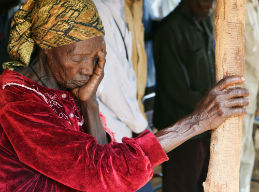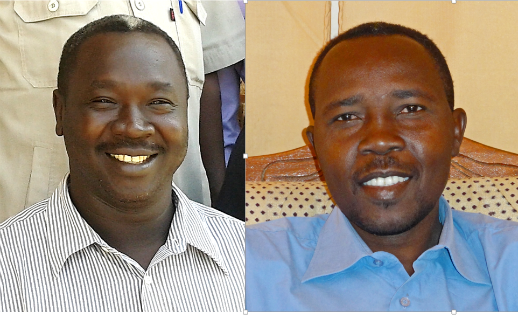Shamal (left) and Hassan Taour are among four Christians on trial for claims Christians are persecuted in Sudan.
World Watch Monitor
The trial of two Sudanese church leaders has started in Khartoum. They are among four Christians accused of trying to tarnish the image of Sudan’s government.
According to the Sudan Tribune, Rev. Hassan Taour and Rev. Kuwa Shamal were charged on Sunday (21 August) with “fabricating videos of incidents of claimed genocide, killing of civilians and burning of villages, besides claims of persecution of Christians in Sudan”.
The prosecutor told the Khartoum North Court the defendants also conducted “intelligence activities and provided material support for rebels in South Kordofan”.
Apart from the two Sudan Church of Christ pastors (both ethnically from South Kordofan’s Nuba Mountains), also charged were Abdulmonem Abdumawla Issa Abdumawla, a Darfuri graduate; and Petr Jasek, a Czech Christian advocate.
Two of the four denied the statements presented by the prosecutors as theirs, while the other two “approved their statements,” said Sudan Tribune, without specifying.
‘They put pressure on the country’
According to Sudan Tribune, the prosecution relied on material contained in laptop, mobile phone and flash memory, saying the defendants sought to distort the image of the government by disseminating information that could be used to put international pressure on the country.

Senior woman praying during a Christian gathering in Nuba Mountains (Word Watch Monitor)
The prosecutors said that charges have been filed against the defendants under articles of the Criminal Code, as well as Article 29 of the Passports and Immigration Law on sneaking into the country illegally, and Article 23 of the Humanitarian and Voluntary Work Act regarding running a voluntary organisation without registration.
Since Sunday’s high security court session, World Watch Monitor has not learned when the defendants are next due in court.
A week earlier, an initial session was attended by four defence lawyers representing prosecution witnesses, and 21 lawyers defending the two pastors, said Radio Tamazuj.
Rev. Taour had been detained without charge since 18 December, in contravention of Sudan’s own law. Rev. Shamal was detained on the same date, released, and then re-arrested again without charge on 24 May.
On 10 May, authorities released another church leader after nearly half a year in detention. Despite his release, the file of Telahoon (Telal) Nogosi Rata is believed to have remained with the Attorney General.
A number of other Christian leaders face restrictions, as Sudan’s government continues to impose a unified Arab Islamic character on territories left under its rule since the independence of the largely African-Christian South in July 2011.
Following South Sudan’s independence, President Omar al-Bashir – wanted by the ICC for crimes including genocide – has reasserted Sudan as an Islamic state governed by Sharia. Pressures have been ratcheted up against Christians since.
Arrests, confiscations and demolitions of churches have increased, and the government has repeatedly stated that new church licences will not be issued.
In August 2015, Khartoum yielded to international pressure and released two South Sudanese pastors, whom it had accused of “spying”. Yat Michael and Peter Yen were in prison for eight and seven months, respectively.
According to Open Doors’ 2016 World Watch List, Sudan is ranked 8th in a list of 50 countries where Christians come under the most pressure. The country has a rating of “extreme” and for the past two years has remained among the top 10 offenders.
Earlier this month, democracy watchdog Freedom House described as “preposterous” the charges, including espionage and terrorism, Sudan had filed against six civil society activists.
